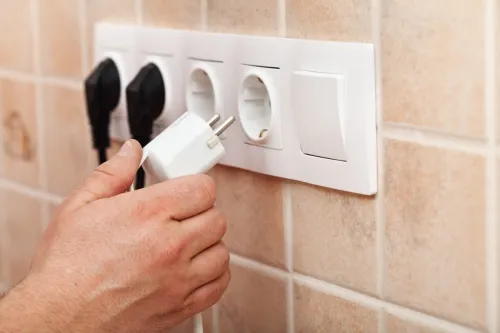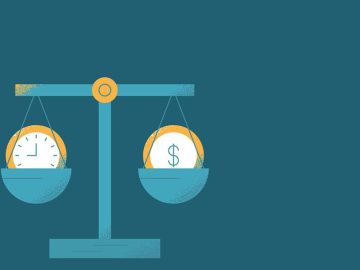The product recommendations in this post are recommendations by the writer and/or expert(s) interviewed and do not contain affiliate links. Meaning: If you use these links to buy something, we will not earn a commission.
According to a 2023 study by NerdWallet, most Americans have a monthly budget, and yet the majority of us still manage to overspend. The good news? Regaining a sense of financial security is easier than it sounds—you just need to know where to start. Oh, and it isn’t all about budgeting, either. We reached out to money-saving expert Andrea Woroch to discuss easy ways to save money each month, from preparing food at home to scoring cash back deals on credit cards, and much more. Read on to see what she has to say, and you’ll walk away knowing how to keep some extra cash in your pocket today, tomorrow, and all year round.
RELATED: How to Coupon: Strategies to Save Big, Retail Experts Say.
Key Takeaways
- Utilizing cash back and rewards programs can turn everyday purchases into savings opportunities, providing extra money back on groceries, gas, and other essentials.
- Negotiating bills and contracts can lead to significant savings. Call your internet or cable provider to ask for a better rate and compare insurance policies to find a more affordable option that still meets your needs.
- Reducing utility bills, cooking at home, and canceling unnecessary subscriptions are practical steps to minimizing monthly expenses and boosting savings.
14 Ways to Save Money Fast
1. Unplug your electronics.
 Nagy-Bagoly Arpad/Shutterstock
Nagy-Bagoly Arpad/Shutterstock
Unplugging electronics when they are not in use can lead to significant savings on your utility bills. And remember, lots of devices consume power even when turned off—a phenomenon known as “phantom load” or “vampire power.” According to the U.S. Department of Energy, these standby devices can account for up to 10 percent of your household electricity use.
If unplugging every electronic device before you leave the house doesn’t seem feasible, Woroch suggests looking into household gadgets that can be controlled remotely. “You can find power strips that come with remotes for those hard-to-reach areas like behind a TV or entertainment system or smart plugs that you can control from your phone,” she says.
2. Meal prep.

 Julia Mikhaylova/Shutterstock
Julia Mikhaylova/Shutterstock
Cooking at home is one of the most effective ways to save money, especially when you incorporate meal prepping into your routine. “By planning out meals, cross-referencing your ingredient list with what you already have at home so you don’t double up, limiting how much fresh food you buy in bulk, and avoiding impulse purchases, you could save [thousands] over the course of a year,” Woroch says.
There are also plenty of promotions available to help you save at checkout. Rewards apps such as Fetch enable you to earn cash back for your grocery purchases by simply uploading pictures of your receipts.
3. Cook at home more often.

 Just Life/Shutterstock
Just Life/Shutterstock
Cooking at home also means you’re not spending money on costly food delivery services. Of course, we all understand the appeal there. A survey from Bread Financial found that 52 percent of consumers ordered takeout because they felt lazy. But, as Woroch reminds us, inflation has caused these prices to skyrocket.
“Giving in to lazy is a quick way to deplete your bank account,” she says. “Save each week by getting in the habit of cooking in bulk and freezing single-portion leftovers.” That way, you’ll have meals to reheat on nights you don’t feel like cooking. You can also take these leftovers to the office so you don’t spend on expensive lunches.
4. Cancel unnecessary subscriptions.

 Rokas Tenys/Shutterstock
Rokas Tenys/Shutterstock
According to a survey commissioned by market research firm C+R Research, 42 percent of Americans with one or more subscriptions say they are paying for something they don’t actually use. Even if you do occasionally lean on a specific service, it won’t hurt to go through your monthly payments in search of those you can live without. Woroch suggests using tools such as OneMain or Trim to help you get started. “Even if it’s a service that costs just a few bucks per month, this can add up and result in a lot of wasted funds,” she says.
RELATED: How to Save Money on Cable and Streaming Services.
5. Use cash back and rewards programs.

 fizkes/Shutterstock
fizkes/Shutterstock
In the world of finance, getting paid to spend money might sound like a fantasy, but it really is a thing. “Sign up for store loyalty programs to earn rewards back on purchases you’re planning to make anyway, as this can offset future purchases,” Woroch advises. “They’re free and offer other money-saving perks like free shipping and free returns, too.”
By choosing a cash-back credit card that aligns with your spending habits, you can earn rewards on the things you’re already buying, from groceries to gas. The trick is to manage these credit cards wisely to avoid any excess debt. Always pay off your balances each month to prevent paying interest.
6. Shop smart by buying dupes or alternatives.

 Portra/iStock
Portra/iStock
Shopping for dupes or alternatives can be a practical way to save money without sacrificing quality. Here are some strategies to help you:
- Plan your purchases: Make a list of what you need before you go shopping. This will help you avoid impulse buys and stick to your budget.
- Use a shopping list: Write down everything you need before you go to the store and stick to it. This will help you avoid buying unnecessary items.
- Shop on weekdays: Shopping on weekdays can often lead to finding more discounts and sales. Avoid weekends when the store is crowded, and prices may be higher.
Bulk buys and generic brands are effective tools for keeping overall expenses in check. While the savings on a single item might seem small, they add up quickly over time. For example, choosing generic household items over name brands can save you a significant amount annually.
You can also buy furniture, clothing, home items, and even electronics secondhand.
“Sign up for buy-nothing groups on Facebook and trade kid’s clothing at Swoondle Society. And always look for gently used or refurbished options,” says Woroch. “You can find gently used clothing for up to 80 percent off at fashion resale sites like Tradesy, used sporting goods at Swap me Sports, and save 60 percent off refurbished gadgets from Best Buy or eBay that offer warranties. “
7. Stop shopping online impulsively.

 Beautrium/Shutterstock
Beautrium/Shutterstock
A SlickDeals report found that the average consumer spends $151 per month on impulse purchases. We get it, online shopping offers convenience—but it can also lead to overspending. To keep your budget intact, set a spending limit and impose a waiting period on your purchases.
“If you can resist a sale, unsubscribe from store newsletters and delete retail apps on your phone that alert you to the newest deal drops,” Woroch suggests.
RELATED: 7 Ways to Save Money on Your Commute, According to Financial Experts.
8. Reduce your debt load.

 Rawpixel.com/Shutterstock
Rawpixel.com/Shutterstock
“If you’re carrying a balance on your credit card, high-interest fees will make it more expensive to pay down and can eat up your cash each month,” says Woroch. Not only does this make saving money more difficult, but it leaves little opportunity to enjoy other splurges, like a new pair of shoes or a weekend getaway. While Woroch says that paying down debt should be a priority, she also suggests talking to your credit card company about your interest rates.
“Begin by negotiating your credit card interest rate,” she says. A study from WalletHub found that 77 percent of credit card members were successful in negotiating a lower interest rate by simply asking their credit card issuer, so it’s definitely worth a shot.
“You can also lower your credit card bill by negotiating an interest rate reduction or consolidating balances using a balance transfer card, which offers up to 21 months with no interest accruing,” says Woroch. She suggests comparing balance transfer credit cards at sites such as CardRates to find one that fits your needs.
9. Rent your stuff.

 AngieYeoh/Shutterstock
AngieYeoh/Shutterstock
Your home might be housing a gold mine of unused items that could be turned into cash. Online marketplaces are buzzing with potential buyers for items including but not limited to:
- Old electronics
- Vintage clothing
- Furniture
- Books
- Collectibles
Decluttering not only frees up space in your home but also adds a bit of cushion to your savings. And you don’t have to stop there, either. “You can also rent a spare bedroom to travelers on Airbnb or VRBO to help cover the bills, so you have extra money to put towards savings,” Woroch advises.
If you’re planning on spending some time away from home, you can actually rent the entire place for events and corporate meetings on platforms like PeerSpace. Other things you can rent: your car when you aren’t using it via GetAround, your parking spot via SpotHero, an RV, and even your swimming pool via Swimly.
10. Bundle insurance policies.

 YAKOBCHUK VIACHESLAV/Shutterstock
YAKOBCHUK VIACHESLAV/Shutterstock
Insurance is a necessary expense, but that doesn’t mean you can’t find ways to save. “You can get a deal on your various insurance policies by bundling policies, increasing deductibles, and maximizing discounts for items like safety features, security systems and for not having any claims on file,” says Woroch. “Comparing rates with competitors can also uncover savings without sacrificing your coverage.”
RELATED: 16 Best Ways to Save Money While Shopping Online, According to Experts.
11. Check out local, low-cost entertainment options.

 Monkey Business Images/Shutterstock
Monkey Business Images/Shutterstock
Just because you don’t have the money to travel overseas doesn’t mean you can’t splurge on a little leisure time closer to home. Woroch suggests booking a hotel in your hometown to enjoy the pool or spa services. That way, you can at least experience the sense of “being away” without spending a ton on getting there. New restaurants are also worth checking out. If you are looking for other, no-spend options, then you can always check out some natural attractions or hiking spots in town.
12. Open a separate high-yield savings account.

 Rawpixel.com/Shutterstock
Rawpixel.com/Shutterstock
If your savings are languishing in a traditional bank account with minimal interest, it’s time to upgrade to a high-yield savings account at a bank or credit union. With interest rates significantly higher than average, these accounts can help catapult you toward your savings goal.
“This interest is compounded daily, meaning your money will make money for you, and earnings are deposited into your account at the end of the month,” explains Woroch. “Where you put your savings matters.” These accounts also often come with no monthly fees and the flexibility of low or no minimum balance requirements.
13. Boost your cash flow.

 Sky Motion/Shutterstock
Sky Motion/Shutterstock
“No matter how much you cut back, you may still be living on a tight budget,” says Woroch.”Earning more can give you the boost needed to build savings, get out of debt, and reach other financial goals.”
While scoring a raise or landing a higher-paying job are the fastest paths to more income, they aren’t always achievable. Finding ways to make a little spare cash in lieu of these milestones is often your best bet.
“Sell items you no longer need through local listings or resale sites like eBay,” suggests Woroch. She reminds us that you can even sell unwanted gift cards on the platform. Other ideas include taking paid surveys via Inbox Dollars, participating in virtual focus groups at Sago, or pursuing flexible side hustles, such as pet sitting and virtual tutoring.
14. Create an emergency fund, just in case.

 SomYuZu/Shutterstock
SomYuZu/Shutterstock
Creating an emergency fund provides you with a financial safety net during unexpected situations, such as medical emergencies, car repairs, or job loss. By having a dedicated fund, you can avoid racking up any additional credit card debt or relying on high-interest loans, which will only lead to further financial strain. “Having an emergency fund is crucial and should be part of your budget,” says Woroch.
RELATED: 7 “Money-Saving” Shopping Hacks That Can Cost You Big.
How Can I Track Spending Habits?
Awareness is the key to managing your finances. Tracking your spending habits can give you insight into where your money is going and reveal surprising opportunities to save. Budgeting apps such as Rocket Money categorize your spending, making it easy to see which areas are eating up most of your budget and where adjustments can be made.
Involving technology in your financial management not only simplifies the process but also provides a level of accuracy that manual tracking can’t match. With apps that connect to your checking account and credit cards, you have a real-time view of your financial health, empowering you to:
- Track your expenses and income
- Set budgets and savings goals
- Analyze your spending habits
- Receive alerts for bill payments and due dates
- Monitor your investments
- Generate reports for tax purposes
FAQ
How can I make sure I stick to my monthly budget?
To stick to your monthly budget, set clear savings goals, track your spending habits with budgeting apps, and make adjustments as needed to ensure you stay within your spending limit.
Are high-yield savings accounts safe?
Yes, high-yield savings accounts offered by reputable institutions are typically insured by the FDIC up to $250,000, making them a safe place to store your savings.
What’s the best way to save money on utility bills?
To save money on utility bills, invest in energy-efficient appliances, use smart thermostats, unplug devices when not in use, and switch to LED bulbs. These steps can significantly reduce your energy consumption and lower your bills.
Is it worth it to sell items I no longer use?
Yes, it’s worth selling items you no longer use. You can make extra cash through online marketplaces, consignment shops, and garage sales.
Wrapping Up
Remember, most money-saving tips don’t require drastic lifestyle changes. It’s about making smarter choices, such as creating a budget, reducing unnecessary expenses, and finding creative ways to stretch your dollars. By implementing these practical tips, you’ll be well on your way to building a robust financial future. So, let this be the year you take control of your finances and watch as your savings grow.
We offer the most up-to-date financial information from top experts and the latest news and research, but our content is not meant to be a substitute for professional guidance. When it comes to the money you’re spending, saving, or investing, always consult your financial advisor directly.





